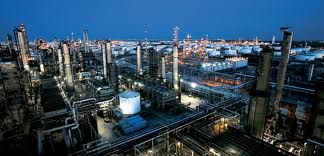
Two U.S. refiners on Thursday unveiled plans that will allow them to use more of the lower-cost crude oil from the prolific Eagle Ford shale play in South Texas.
Privately-held Flint Hills Resources <FHR.UL> wants to spend $250 million to increase its supply of Eagle Ford crude to beyond the 150,000 barrels per day (bpd), which is half of all the oil consumed daily by the company's Corpus Christi, Texas, refinery, company officials said on Thursday.
Phillips 66's <PSX.N> 247,000 bpd Sweeny, Texas, refinery will take 30,000 bpd of Eagle Ford oil beginning in 2014 when Kinder Morgan Energy Partners <KMP.N> completes a $90-million extension of a pipeline to the plant, which is 66 miles south of Houston.
The investments are the latest efforts by the U.S. energy to quickly take advantage of the unexpected boom in shale oil patches like Eagle Ford, where output has trebled in a year. The surge in output of largely light, sweet crude has flummoxed many Gulf Coast refiners, who had invested billions in preparation of a growing diet of dense, sour imported barrels.
The Flint Hills project will take one to two years for regulatory approval from the Texas Commission on Environmental Quality and U.S. Environmental Protection Agency and another two years to add new pumps, heaters, heat exchangers and tanks at the Corpus Christi refinery located just south of the Eagle Ford field.
"We want to spend a bunch of money to increase our capacity for Eagle Ford and to reduce our air emissions," said Phil Gaarder, Flint Hills Corpus Christi vice president and refining manager in a conference call with reporters.
For the Sweeny refinery, Kinder Morgan will build 27 miles of 12-inch (30.48-centimeter) pipe to run lateral from its Kinder Morgan Crude Condensate pipeline, which runs from the Eagle Ford shale fields to the Houston Ship Channel.
"This pipeline lateral will provide yet another attractive delivery point for customers of our KMCC pipeline while providing Phillips 66 with enhanced access to price-advantaged Eagle Ford crude and condensate," KMP Products Pipelines President Tom Bannigan said in a statement.
The Kinder Morgan lateral pipeline could expand capacity to 100,000 barrels in the future, from the initial 30,000.
Oil from the Eagle Ford fields has boomed in the past three years. Energy companies produced 283,292 barrels per day of oil in the Eagle Ford in June, according to the Texas Railroad Commission - nearly triple production of a year ago.
Light, sweet Eagle Ford crude is lower-priced than other global crudes, which increases profitability for refiners by cutting their crude costs. Eagle Ford crude was priced at $93.75 a barrel on Wednesday, about a $3 discount to U.S. crude benchmark West Texas Intermediate and a $19 discount to Louisiana Light Sweet.
In addition to the Kinder Morgan project, at least nine other pipeline projects have started up or are under construction to transport that surging output to refineries along the U.S. Gulf Coast.
Flint Hills parent Koch Industries' pipeline company has started up two of those projects to move Eagle Ford crude to Corpus Christi from Pettus, Texas, and Karnes County, Texas.
The Corpus Christi refinery may see incremental increases in the refinery's overall crude throughput capacity, but Gaarder said it was unknown by what amount as Flint Hills wraps up engineering work before requesting permits.
Most of the work will be done on the two crude distillation units at the refinery's West Plant, which has crude throughput capacity of 230,000 bpd, during planned overhauls and should not require shutting the entire refinery.
Flint Hills has watched Eagle Ford output grow in the last three years, Gaarder said, but the refinery - as it is now configured and under its current permits - has hit its limit of how much of that crude it can process.
Source: Reuters
We use cookies to improve your experience. By continuing to use our site, you accept our Cookies, Privacy Policy,Terms and Conditions. Close X